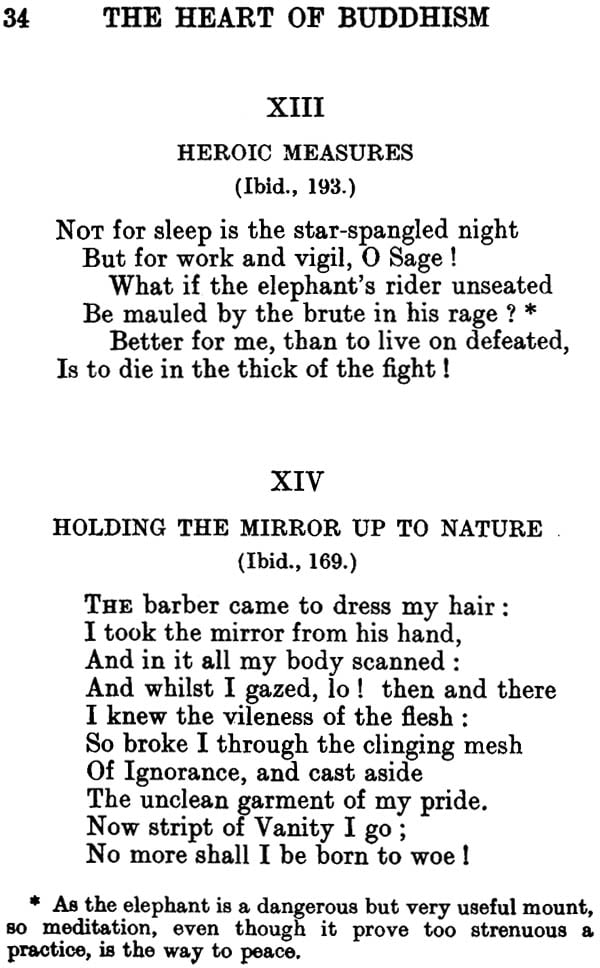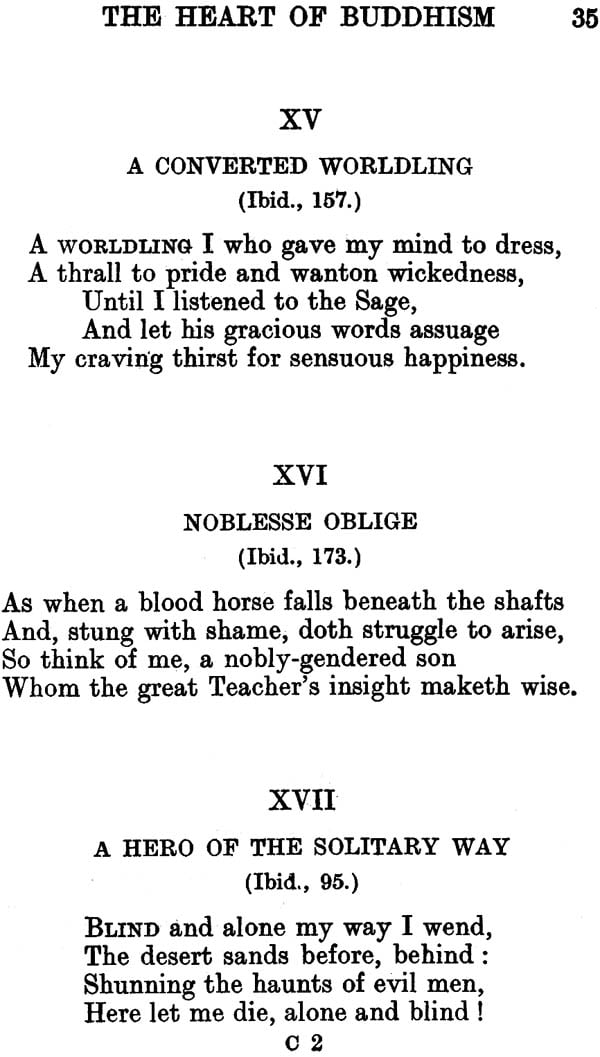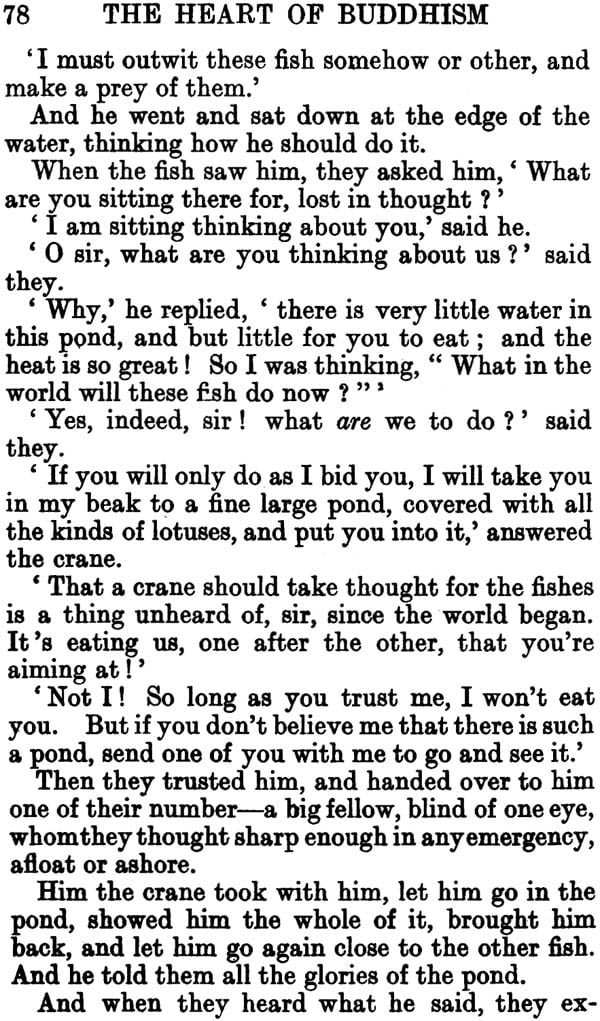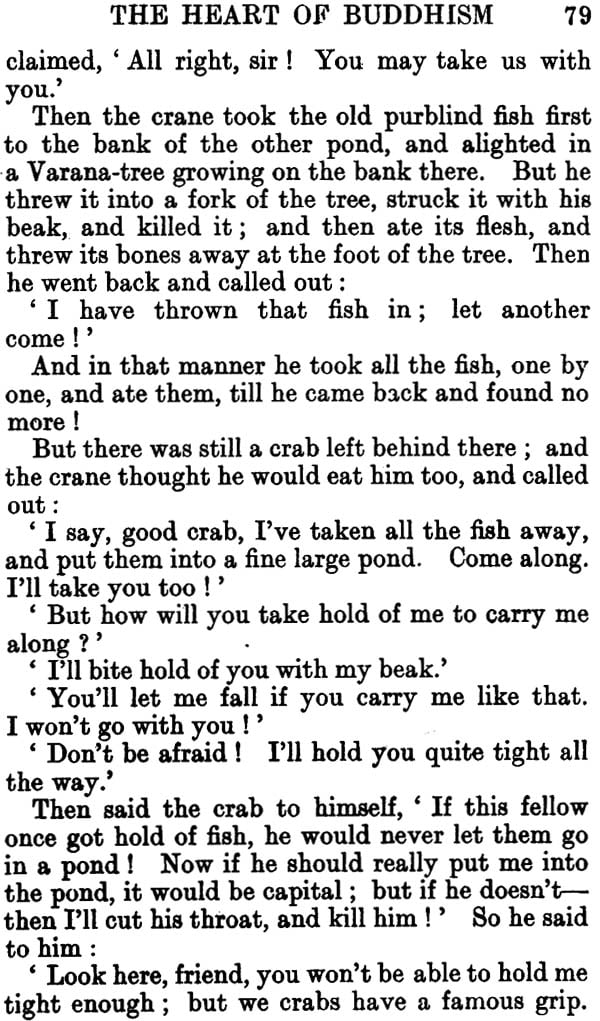
The Heart of Buddhism
Book Specification
| Item Code: | IDI108 |
| Author: | K. J. Saunders |
| Publisher: | Pilgrims Book Pvt. Ltd., Delhi |
| Language: | English |
| Edition: | 1998 |
| ISBN: | 9788176240376 |
| Pages: | 96 |
| Cover: | Paperback |
| Other Details | 4.6"X 6.9" |
| Weight | 70 gm |
Book Description
BUDDHISM as a separate religion has almost ceased to exist in India; yet it is part, and a vital part, of India's Great heritage.
It has left its mark upon her great buildings, and not less upon her national consciousness. Not only did it absorb and crystallize much from the Hinduism out of which it sprang, and express much of Hindu aspirations and ideals, but it has in turn been reabsorbed into that amazing creed and has given of its life and spirit to it.
Especially is this true of the ethical teaching of Gautama Buddha. This is a heritage for which India can hardly be too grateful; for it has been her greatest weakness that she has never risen to the conception of a Righteous God, and so has missed the moral fibre which that conception alone can impart. And whilst Gautama himself failed of this sublime achievement, and therefore failed to hold her allegiance, yet he taught of a force 'which makes for righteousness', and his own example of pure and loving manhood has been a mighty of pure for good.
Had India been able to seize the best in Buddhism, and to blend it with her mystic intuition of the reality and the nearness of God, how different her story would have been! O-day when the Christ, purer, more loving, more majestic and mighty to save, is beginning in strange and incalculable ways to dominate her sub-consciousness, and to dictate the programme of her social reforms, it is being seen that Gautama, agnostic though he was yet a forerunner, and is still a prophetic voice of whom she has much to learn.
'Give me the strength', she cries, 'lightly to bear my joys and sorrows. Give me the strength to make my fruitful in service. Give me the strength never to disown the poor, or bend my knees before insolent might.'
Such strength is truly a 'gift', and it is not Gautama's to give; but sage advice, and winning example, and the incentive of a lofty ideal in which barriers of caste are broken down and men live peaceably together, - these are not valueless.
To the Eastern reader, therefore, I offer this little anthology, believing that it has its own place in the Heritage of India Series. And I trust that it may also find acceptance in the West, and may contribute something to the study of a religion which is exercising many minds, and is so often misunderstood alike by friend and foe.
The Western student of Buddhism is almost inevitably fascinated by what H. C. Warren has called 'the strangeness of the intellectual landscape'; yet he is not seldom bewildered and by its numberless repetitions. Slowly the conviction dawns on him that same way many times, and is not, at the end of his wanderings, greatly advanced towards the heart of the religion.
A selection of verses taken from established Buddhist texts, The Heart of Buddhism provides the reader with an insight into the teachings that conquered the orient more than 2500 years ago. The verses included in the text lead one to the true essence of Buddhist thought and belief.
Tough considered by, many an agnostic, the Buddha showed mankind a way to co-exist in harmony with the elements and all living beings that is still very relevant even today in the twenty -first century.
| Introduction | 7 | |
| Verse Selections: | ||
| I | The Teacher a farmer | 19 |
| II | Vanitas, Omnia Vanitas | 21 |
| III | Disillusion | 21 |
| IV | The Misery of life | 22 |
| V | Karma | 22 |
| VI | Karma | 23 |
| VII | Four Sorrowful Things: A Riddle and an Answer | 24 |
| VIII | Another Riddle and its Answer | 24 |
| IX | The Song of Great Blessing | 25 |
| X | The True Recluses | 28 |
| XI | The Abode of Peace | 31 |
| XII | Meditation | 33 |
| XIII | Heroic Measures | 34 |
| XIV | Holding the Mirror up to Nature | 34 |
| XV | A Converted Worlding | 35 |
| XVI | Noblesse Oblige | 35 |
| XVII | A Hero of the Solitary Way | 35 |
| XVIII | All' is Fleeting | 36 |
| XIX | A Memento Mori | 36 |
| XX | The Body | 37 |
| XXI | 'The View depends upon the point of View' | 37 |
| XXII | The Hog | 38 |
| XXIII | Perseverance: (1)Crede experto | 39 |
| (2) Hope for the Climber | 39 | |
| XXIV | The Victory of Stoic | 40 |
| XXV | The Kingdom of the Mind | 40 |
| XXVI | The Undaunted Heart | 40 |
| XXVII | 'A Contented Mind is a Blessing Kind' | 41 |
| XXVIII | The Strenuous Life of Meditation | 41 |
| XXIX | A Buddhist S. Anthony | 42 |
| XXX | Married Love is Lust | 42 |
| XXXI | A New Man | 43 |
| XXXII | A New Woman | 43 |
| XXXIII | Unsafe Confidants | 44 |
| XXXIV | A Father Greets his Son | 45 |
| XXXV | A Son Greets his Mother | 45 |
| XXXVI | Compassion | 46 |
| XXXVII | Compassion to Animals: A Charm against Snakes | 47 |
| XXXVIII | The Spirits of the Departed | 48 |
| XXXIX | The True Brahman | 51 |
| XL | Labels, False and true | 51 |
| XLI | The False and the true | 52 |
| XLII | The Song of Victory and Blessing | 52 |
| XLIII | Proofs of the Buddha's Existence | 58 |
| Prose Selections: | ||
| XLIV | The Ogress Kali | 61 |
| XLV | Prince Wessantara | 69 |
| XLVI | A Buddhist Solomon | 73 |
| XLVII | The Cruel Crane Outwitted | 75 |
| XLVIII | True Love | 81 |
| XLIX | Wrong Love | 83 |
| L | The Problem of Suffering | 85 |
| LI | The Power of the Norm | 86 |
| LII | Do the Dead Meet Again? | 87 |
| LIII | The Layman's Part | 89 |









